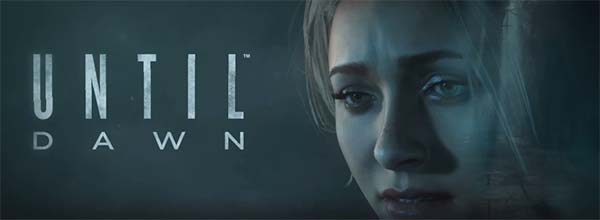
Here is a game that somehow managed to slip under the radar for me. As a snob for strong narrative-based games, I was surprised that a project like Until Dawn managed to escape my attention until a couple weeks prior to its release. Once I heard about it though, I was immediately intrigued. I knew it wasn't going to be a proper survival horror game, but it looked to have a lot of potential to move the horror genre (and gaming in general) in interesting directions. I was doubly surprised when I went to go by the game a couple days after its release so that I could play it over the weekend, only for it to be sold out in the two stores that I went to. It's the first time in about ten years that I've had trouble finding a game on store shelves within a week of its release, but I doubt that I'll have to break my long-standing boycott for pre-orders. So I had to resort to ordering it off of Amazon Prime with 2-day delivery and play it the next weekend.
Suspend your disbelief - and your common sense
Don't be fooled into thinking that Until Dawn is something other than what it is. It is an interactive movie with branching story. It is not an open-ended survival game! Anyone familiar with Heavy Rain or the Telltale Games will have a good idea of how the game will play out. The things you do and the actions and dialogue available are very tightly scripted. You won't be making decisions on how the group splits up, who goes where, or even what any individual character might be doing at any given time. Large chunks of the game are just dialogue and cutscenes, stopping you every now and then to let you make one of two choices, or showing a button prompt on screen to keep the action going (and sometimes keep the character alive). There are even some action sequences that could have been playable, but which are strictly non-interactive cutscenes.
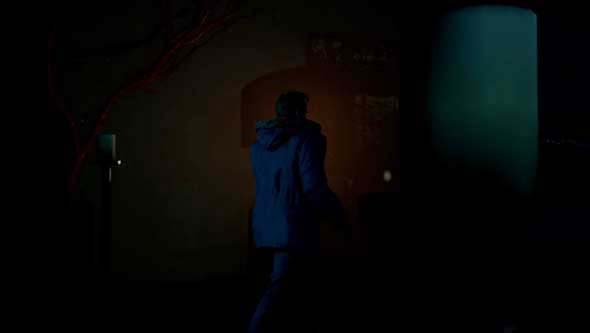
How about lighting some friggin' candles instead of groping around in the dark?
The only time that the game opens up more is when you must explore rooms for clues or evidence. In these cases, you have complete control of character movement and can walk around mostly freely. But interactions are severely limited. You can only interact with the select few objects that the developers intended for you to interact with.
These limitations can be very frustrating because the game doesn't let you do some obvious, common sense things. Upon entering the lodge, I'd like to have been able to light the candles instead of having to wander around in the dark for the next few chapters. Later, when investigating something crashing through a window, I'd like to have been able to take the rifle I just found on the wall. And even later, after the rifle didn't have enough bullets to shoot the murderer, it would be nice to have been able to open up the revolver I just found to make sure that it's loaded and find out how many bullets are in the chamber. And the list of dumb oversights goes on...
Common sense precautions like taking a melee weapon or checking that your new gun is loaded are not possible.
These limitations are further exacerbated by the esoteric nature of some of the decisions. Since all decision are binary (usually consisting of a "helpful" / "safe" option or an "antagonistic" / "risky" option), it's often unclear exactly what the character will do, and the outcome often plays out in a non-interactive cutscene. The character may not say or do exactly what the option described, which might lead the player to think "that's not what I meant to do / say!", and sometimes a decision might railroad you into following through in a way that you don't want to.
Granted, the options need to be somewhat vague, and the consequences shouldn't be obvious. That would make the game too easy and dull. The game has to utilize some of the classic horror movie tropes in order for the narrative to work. After all, the characters don't have the foresight to know that they're in a horror movie game. I accept that there needs to be limitations on the precautions that the player can take, but the player also needs to feel like they have more agency. [More]
1eebd3c1-dc0a-4bc2-9d50-ae593ac587ec|4|2.8
Tags:Until Dawn, Supermassive Games, PlayStation, PS4, PSN, Sony, exclusive, horror, cabin, slasher, saw, consequences, narrative, drama, pre-order, Hayden Panettiere, Peter Stormare, Brett Dalton, Rami Malek, Galadriel Stineman, Noah Fleiss, Jordan Fisher, Nichole Bloom, Meaghan Martin, Ella Lentini
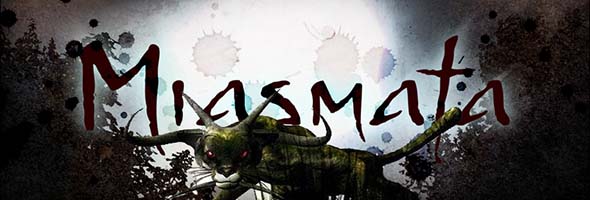
While looking for new survival horror games on Steam, I stumbled onto a very intriguing title: Miasmata. During my holiday break from work, I decided to boot up the game and see if it scratched my survival horror itch.
It didn't, on account of not actually being a survival horror game. But what I found instead was an equally interesting premise that immediately caught my attention and piqued my curiosity.
The Johnson brothers kept this game about as simple as it could possibly be (perhaps to its detriment). They had a core concept, and they stuck to it. As such, Miasmata is a very novel game. It is probably the only game that I've ever played that is solely about scientific research.
The end goal is to cure a disease that the character has contracted and then escape the island. This disease acts as the central challenge to the game: you have to periodically medicate yourself in order to control the symptoms, but all medications must be derived from the local flora. Failure to do so can slow you down, blur your vision, and eventually kill you. A sheer majority of the game, thus, consists of wandering around the island collecting samples of plants, and then returning them to the nearest laboratory to examine them and use them to concoct various potions. In addition to medicines, you can also create potions to enhance your physical strength and perception. Doing so will allow you to run and swim further, and allow you to always know your location on the map (respectively).
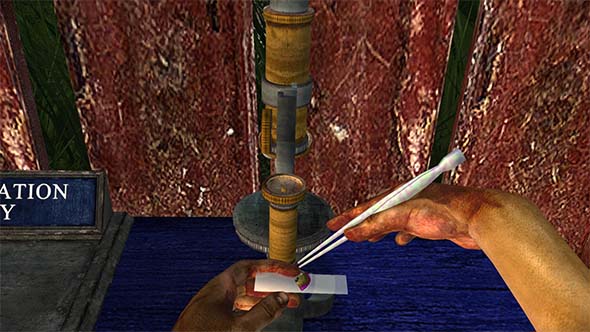
Stand back! I'm about to do SCIENCE!
Unfortunately, the process of analyzing the specimens is automated (via a skip-able cutscene). You don't actually have to do anything in order to figure out what the plant's effects are going to be, and no actual scientific knowledge is required by the player. Each plant also only has one effect, so the potion-making mechanic (which is the core of the game) is pretty shallow.
The effects of each plant will be noted in your journal, which is one of the best journal features of any game that I've ever played. It has a handy status page that includes pockets for storing your medicines, as well as holding your water flask. It also shows your objectives and has tabs to collected notes, your research results, and the map. The journal is also populated with hyperlinks that take you to the journal page with the relevant information. For example, if you find a note with ingredients for an objective drug, the status page will add a hyperlink to that note underneath the objective. It's every bit the journal that Silent Hill: Downpour wanted to have!
As you explore, you'll also find camps left behind by the deceased research team. These camps can contain notes that can reveal bits of backstory, provide recipes for various potions, or point you in the direction of key plant specimens. The camps also act as safe places for you to restock your supplies (including water), rest, and save your progress.
Keeping yourself hydrated and rested is important, as failure to do so can aggravate the symptoms of your illness and potentially kill you. Unfortunately, the feedback for this isn't terribly great. You'll get a notification when you're thirsty, but the game doesn't bother to tell you that you're tired. Instead, your health just starts rapidly deteriorating for no apparent reason. It took me a while to figure out that it was due to a lack of sleep.
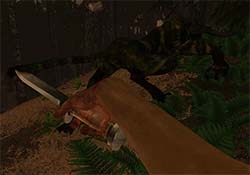
Combat mechanics are present,
but they don't have any affect.
A curious omission is that you don't have to eat. The game even includes various weapons scattered around the island, and there is an attack and throw command. But you can't attack the hostile panther-like creature that occasionally appears to hunt you, nor can you hunt and kill any of the game's various wildlife (beetles, squirrels, birds, and so forth). So you can only run and hide from the creature, and you only collect plants, which don't need to be attacked in order for specimens to be collected. So why are the weapons and attack mechanic even in the game?
Probably the second most significant mechanic is the map triangulation feature. Instead of revealing the map passively as you walk through it, the player must actively identify the location of landmarks ... [More]
d991856a-87f2-4dc9-8a5d-e20c1a004113|0|.0
Tags:Miasmata, IonFX, Bob Johnson, Joe Johnson, Steam, indie gaming, survival, action, adventure, horror, island, science, laboratory, specimen, sample, chemistry, map, compass, cartography, triangulation
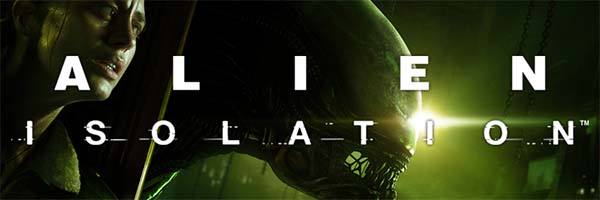
There is no shortage of games that have been based on the Aliens movie. Heck, even Starcraft is basically an unlicensed Aliens versus Predator game! But games that have the Aliens name on them have a very shaky track record. Some have been good. Others have been absolutely terrible. Last year's highly-anticipated Aliens: Colonial Marines (by Gearbox) just might have been the worst of the bunch, and left a very sour taste in fans' mouths.
But this new game is different. It's developed by Creative Assembly (of Total War fame), and its actually based on the first film of the franchise: Alien (singular).
Where the sequel Aliens is a high-octane sci-fi action film about a battalion of macho space marines being put in their place by a hive of aggressive xenomorphs, Alien is a much slower and more cerebral sci-fi horror movie about a group of space truckers who get picked off one by one by a single hostile xenomorph. This shift in focus from the action-packed sequel to its smarter horror predecessor is a welcome change for the franchise and a breath of fresh air in AAA game development. For over a decade now, horror has been on the decline when it comes to big-budget games. This is thanks in part to Resident Evil 4, and the only major horror game that's come out since has been Dead Space. It seemed that the slower, more cerebral style of horror that was popular during the PS1 and PS2 era (with games like Resident Evil and Silent Hill) was all but dead in mainstream gaming.
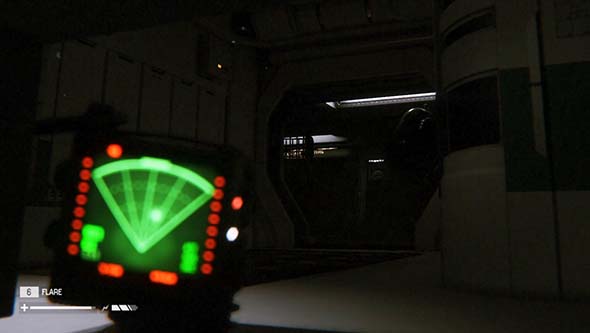
The motion tracker has a nifty control that lets you change focus between the tracker and the background environment.
So does Alien: Isolation live up to the hype and breath new life into the classic genre of survival horror?
... [More]
8984569a-40c8-4028-ae85-daf24bd13be6|3|5.0
Tags:Alien Isolation, Alien, the Creative Assembly, Ripley, Sigourney Weaver, Ridley Scott, Dead Space, science fiction, horror, survival horror, movie tie-in
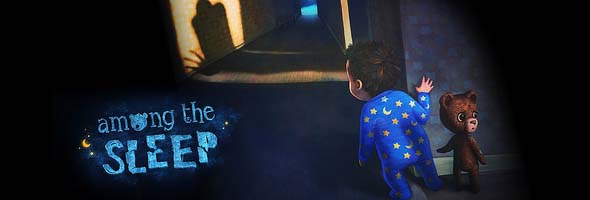
This is a game that caught my attention back in the beginning of the year. I was on the lookout for new horror games to whet my appetite, and the novelty of this little Indie game had me intrigued.
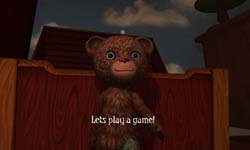
The teddy bear actually comes off as a bit of a creeper at the beginning of the game..
The novelty of Among the Sleep is that the player character is a two-year-old toddler. I actually think that this is a very clever conceit for a horror game. The world can be a very big, scary place for a small child, full of things that are outside of the child's control and beyond the child's understanding. A young child is completely dependent upon its parents or caregiver, which makes them inherently very vulnerable. Unfortunately, since the game is being played by adults, we can't play the game with the ignorance and naivety of a two-year-old, so we would see any real-world environment as exactly what it is: not scary.
So in order for this to work, the designers would have to be very clever in how the environments are presented. Easily he most effective part of the game is the early chapters when the child is lost in a closet and then exploring the house after waking up to find his mother and teddy are absent.
The first person perspective puts the camera very low to the ground, which makes the ordinary environments look large and menacing. The character moves slowly and clumsily (running for more than a few second results in the character falling on his face). Thus, simple hallways seem long and treacherous. Even interactions as simple as opening a door require a small amount of puzzle-solving since the character can't reach a door handle without climbing onto something. This section takes good advantage of the central concept of playing as a toddler by using the legitimate hugeness of the real world, and tapping into our own innate desire to protect and shelter children, in order to make the player feel small and vulnerable.
You even pause the game and access menus by covering your eyes with your hands! Hooray for a lack of object-permanence!
It is a promising start to the game.
But instead of expounding upon this and turning an otherwise mundane environment into an intimidating one, the design quickly shifts into a blatantly-imaginary, whimsical dreamscape. This disconnect from reality suddenly shatters the immersion of the child character, and squanders the inherent novelty of the game's central concept...
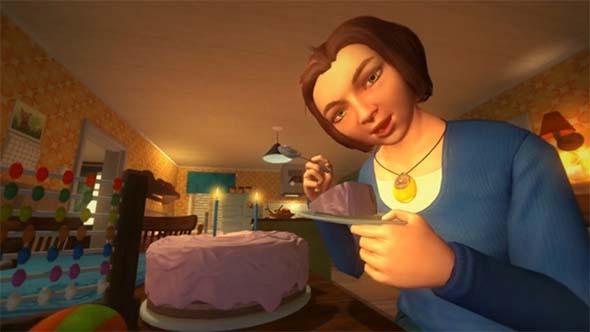
The mother plays an important role in the narrative,
but the player doesn't interact with her long enough to develop any attachment to her. [More]
4aa927f9-d80e-447e-bee0-6fcf21f94621|1|5.0
Tags:Among the Sleep, Krillbite Studio, horror, child, toddler, family, mother, memories, platformer, puzzle, physics, indie gaming, Steam, PC, Unity
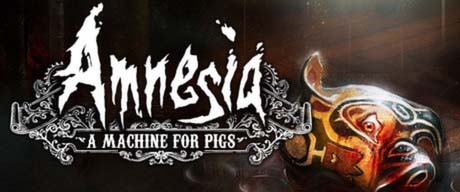
Is Frictional Games working on a new IP? I'm a bit curious as to why they outsourced development of the aptly-named A Machine for Pigs to the third-party developer The Chinese Room. Frictional's staff did stay on as "producers" for this game, so I'm sure that the final product is still consistent with what Frictional would have wanted if they had developed it themselves, and I think the overall story was still written by people at Frictional (but I could be wrong on that account). In any case, the change in development team has certainly had a dramatic effect on the way that the new game plays. The very core gameplay of exploring a linear dungeon with a flashlight is retained, but all the mechanics and the underlying feel of the game are completely different than its predecessor. This isn't necessarily a bad thing, as Amnesia: the Dark Descent wasn't perfect.
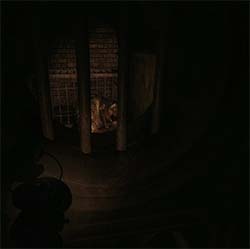
Once again, the underlying premise that sets up Amnesia: a Machine for Pigs is that your character wakes up in a mansion with no memory of who he is or why he is there. Your early exploration of the mansion reveals some vague threat, and you are forced to descend into a deep dungeon in order to discover who you are and resolve the threat. Along the way, you'll encounter deformed creatures and collect notes and documents from your former self explaining the situation, as well as have the occasional hallucinatory flashback as your memory slowly returns. But if you're worried that this sounds too much like the previous game, then fear not: A Machine for Pigs takes an entirely different approach to the gameplay and has a totally different feel to the entire experience. [More]
d070d945-e6da-4541-a97f-8240050b5cc7|1|4.0
Tags:Amnesia: a Machine for Pigs, Amnesia: the Dark Descent, review, the Chinese Room, Frictional Games, Steam, Victorian, England, industrial, survival, horror, survival horror, mansion, amnesia, Battle of the Somme, Silent Hill, Silent Hill Shattered Memories, Resident Evil, checkpoint, indie gaming
|

| 12 | | | | | | | 60 | | 11 | | | | | | | 55 | | 10 | | | | | | | 50 | | 09 | | | | | | | 45 | | 08 | | | | | | | 40 | | 07 | | | | | | | 35 | | 06 | | | | | | | 30 | | 05 | | | | | | | 25 | | 04 | | | | | | | 20 | | 03 | | | | | | | 15 | | 02 | | | | | | | 10 | | 01 | | | | | | | 05 |
|